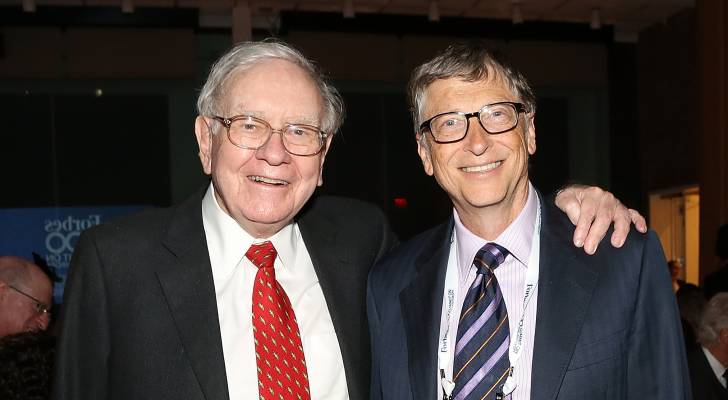
World-renowned billionaires Warren Buffett and Bill Gates were once asked at a gathering to write down on a sheet of paper their secret to success in one word.
They both gave the same answer: focus.
Don’t miss
- I’m 49 years old and have nothing saved for retirement — what should I do? Don’t panic. Here are 5 of the easiest ways you can catch up (and fast)
- Thanks to Jeff Bezos, you can now become a landlord for as little as $100 — and no, you don’t have to deal with tenants or fix freezers. Here’s how
- Gain potential quarterly income through this $1B private real estate fund — even if you’re not a millionaire. Here’s how to get started with as little as $10
“The thing you do obsessively between age 13 and 18, that’s the thing you have the most chance of being world-class at,” Gates told Charlie Rose in a 2016 television interview.
In his case, the activity Gates was obsessed with was coding — which worked out pretty well. Gates went on to co-found Microsoft and became a millionaire in his 20s. He’s now the seventh wealthiest person on the planet, according to the Forbes real-time billionaires index, with a net worth of around $127 billion.
When Buffett was interviewed shortly afterward by CNBC, he was asked what he was obsessed with as a teenager.
“Well, I was pretty interested in investments,” he said.
When he was just 11 years old in 1942, Buffett says he took $114.75, his life savings at the time, and made his first investment, buying three shares of oil and gas company Cities Service (now called Citgo).
Fortune has since smiled on Buffett, who is now known as one of the most successful investors of all time.
At 94 years old, Buffett has finally decided to retire from his longtime post as CEO of Berkshire Hathaway, having announced the decision at the company’s annual shareholder meeting in early May. Berkshire owns dozens of giant brands, including insurer Geico, battery maker Duracell and restaurant chain Dairy Queen. He ranks fifth on the Forbes real-time billionaires index with a net worth of around $160 billion.
Buffett recounted the story to CNBC about Gates’s father gathering a group of men many years ago and asking them to share one word that accounted for each person’s success. Buffett and Gates wrote down the same thing without either knowing the other one’s answer ahead of time.
“He was focused on software, I was focused on investments,” Buffett said. “It gave me a big advantage to start very young — there’s no question about it.”
If you’re keen on following the shared ethos of these billionaires but you’re long past your teenage years, it may not be too late. Here are three ways to focus your investing strategy to emulate some of Buffett and Gates’s wealth-building success.
Start early and stay focused
The earlier you start investing, the better off you can possibly be. That’s probably the most common piece of investing advice — and it’s something that Buffett and Gates both stand by.
Buffett once described earning compound interest — interest you earn based on your personal contributions and the interest you’ve already earned — as the ability to snowball your wealth.
“We started building this little snowball on top of a very long hill,” he said at Berkshire Hathaway’s annual shareholders meeting in 1999. “The trick is to have a very long hill, either start very young or live to be very old.”
There are many ways to start investing. You can invest in stocks or index funds through a traditional brokerage account, or you can use tax-friendly investment vehicles like a 401(k) account (if your employer offers one) or an individual retirement account (IRA).
Once you start investing, it’s important to stay focused. It’s possible to put your money to work every single day, for example, if you invest your spare change. And remember, the more time you have to earn interest, the bigger the rewards you’ll see.
Read more: Want an extra $1,300,000 when you retire? Dave Ramsey says this 7-step plan ‘works every single time’ to kill debt, get rich in America — and that ‘anyone’ can do it
Focus on quality and value
Buffett is famously a proponent of value investing, which is a strategy that involves buying stocks that are trading below their intrinsic value.
He would look for companies with long-lasting earning potential, consistent earnings, good cash flow and a low amount of debt.
He also liked to hold high-quality stocks for a long time — as shown via long-term investments in blue-chip companies like American Express and Coca-Cola — and famously wrote in his 1996 letter to shareholders: “If you aren’t willing to own a stock for 10 years, don’t even think about owning it for 10 minutes.”
Some good examples of value investing in Buffett’s portfolio, on the eve of his retirement from Berkshire, are his stakes in Apple and Coca-Cola. Apple now ranks as Berkshire’s largest stock holding, making up about 28% of the conglomerate’s entire portfolio.
“It just happens to be [a] better business than any we own,” Buffett said of the technology giant at the 2023 Berkshire Hathaway annual shareholders meeting — alluding to Apple’s impressive financial metrics.
Focus on learning and improving
It’s likely you’ll see both gains and losses through the lifetime of your investment portfolio. The question to ask yourself is: how can I turn my investing blunders from the past into successes in the future?
Even investing greats like Buffett have made mistakes over time. At the 1997 Berkshire Hathaway annual shareholders meeting, Buffett admitted to making “mistakes of omission,” where he had the opportunity to invest in attractive businesses but did not act.
Talking about some of those mistakes, Charlie Munger — Buffett’s long-time business partner and former vice-chairman of Berkshire, who died in 2023 — said that “most people get very few, what I call, no-brainer opportunities, where it’s just so damned obvious that this is going to work.”
He added: “I think people have to learn to have the courage and the intelligence to step up in a major way when those rare opportunities come by.”
But not everyone has the investing knowledge to jump on those opportunities. To gain some advantage, you may want to consider working with a professional financial adviser who can translate the investing world for you — or you can use investing apps and online platforms that will do much of the work for you.
What to read next
- Don’t have the cash to pay Uncle Sam in 2025? You may already be eligible for a ‘streamlined’ handshake with the IRS — here’s how it works and how it can potentially save you thousands
- Here are 5 ‘must have’ items that Americans (almost) always overpay for — and very quickly regret. How many are hurting you?
- Robert Kiyosaki warns of a ‘Greater Depression’ coming to the US — with millions of Americans going poor. But he says these 2 ‘easy-money’ assets will bring in great wealth. How to get in now
This article provides information only and should not be construed as advice. It is provided without warranty of any kind.


